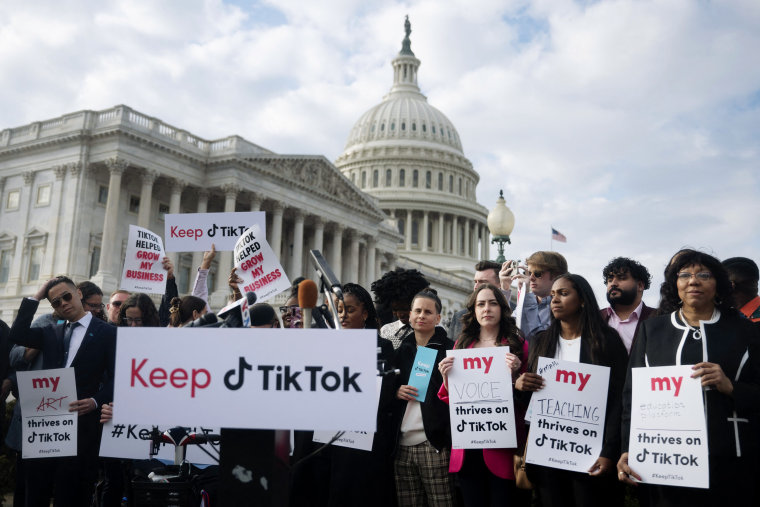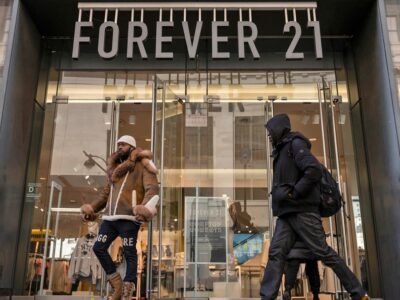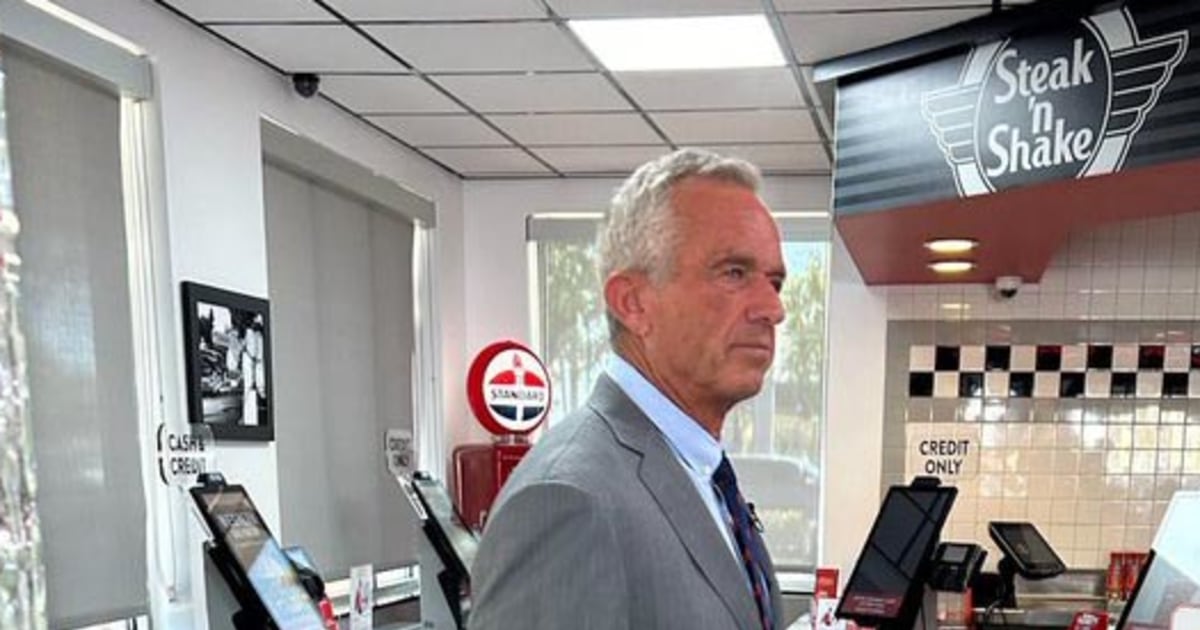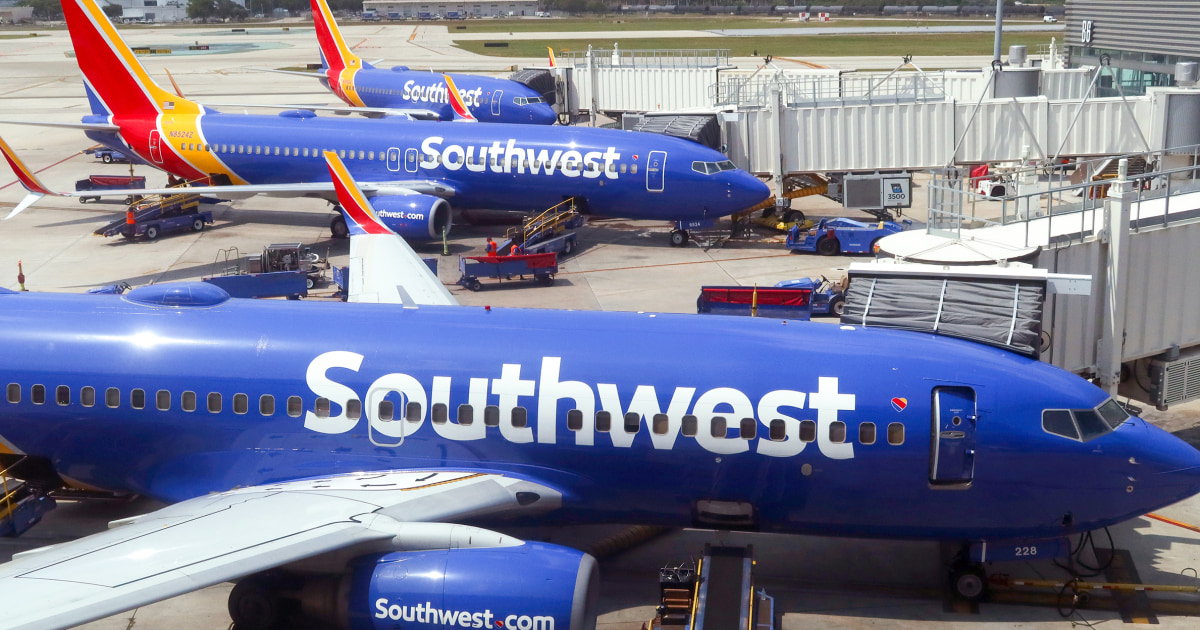
WASHINGTON — The Supreme Court on Friday delivered a blow to TikTok by upholding a law that could lead to a ban on the video-sharing social media platform in the United States.
In an unsigned opinion with no dissents, the justices rejected a free speech challenge filed by the company, meaning the law is set to go into effect on Sunday as planned.
The bipartisan law requires China-based TikTok owner ByteDance to divest itself of the company by Sunday, the day before President-elect Donald Trump is to take office. If no sale takes place, the platform used by millions of Americans will in theory be banned.

Opponents to a TikTok ban demonstrate on Capitol Hill on March 22, 2023.Brendan Smialowski / AFP via Getty Images file
In what is a fast-changing situation, it is unclear what will happen at that point, as there are signs that Trump may seek to keep the app available. The Biden administration has also signaled it will not take any action to enforce the law on Sunday.
In a statement Friday evening, TikTok indicated it would go dark on Sunday if the Biden administration cannot provide “a definitive statement to satisfy the most critical service providers assuring non-enforcement.”
“The statements issued today by both the Biden White House and the Department of Justice have failed to provide the necessary clarity and assurance to the service providers that are integral to maintaining TikTok’s availability to over 170 million Americans,” TikTok said in the statement, posted to X.
The anti-TikTok sentiment that led Congress to pass the law, driven by the concern about the level of control the Chinese government has over the company, has rapidly dissipated in some quarters.
White House press secretary Karine Jean-Pierre issued a statement saying that “TikTok should remain available to Americans” but that the national security issues should be addressed.
“Given the sheer fact of timing, this administration recognizes that actions to implement the law simply must fall to the next Administration, which takes office on Monday,” she added.
Trump responded on Truth Social, although he did not explain exactly what he plans to do.
“The Supreme Court decision was expected, and everyone must respect it. My decision on TikTok will be made in the not too distant future, but I must have time to review the situation. Stay tuned!” he said.
Earlier, Trump said in another post that he had discussed TikTok with Chinese President Xi Jinping during a Friday call.
In response to the ruling, TikTok CEO Shou Chew posted a video on the app praising Trump and expressing hope for “a solution that keeps TikTok available.”
The Justice Department had raised two key issues in defending the law: that the Chinese government could exert control over what content users see in order to influence public opinion, and that it could collect sensitive data on millions of American users.
In the ruling, the court acknowledged that the national security rationale affected its analysis of whether there was a free speech violation under the Constitution’s First Amendment, with the justices focusing on the data collection issue.
The court concluded that the reasons for enacting the law are “decidedly content agnostic,” meaning they have nothing to do with restricting certain speech.
“TikTok’s scale and susceptibility to foreign adversary control, together with the vast swaths of sensitive data the platform collects, justify differential treatment to address the government’s national security concerns,” the court said.
“The challenged provisions further an important government interest unrelated to the suppression of free expression and do not burden substantially more speech than necessary to further that interest,” the court added.
In a concurring opinion, Justice Neil Gorsuch expressed skepticism about the government’s content manipulation argument, saying that journalists, publishers and others “routinely make less-than-transparent judgments about what stories to tell and how to tell them.”
Trump had filed an unusual amicus brief at the court urging it to put the law on hold in the hope that he could “pursue a political resolution” on the issue once in the White House.
During his first term in office, Trump himself tried to ban TikTok, but he has since changed his tune. He recently said he had a “warm spot” in his heart for the platform and met with the company’s CEO.
One of Trump’s options would be to grant a 90-day extension for TikTok to find an American buyer by citing a provision in the law aimed at forcing a sale. There has been speculation about potential buyers, but ByteDance has said it will not approve a sale.
Trump could also vow not to enforce the law, but that might not be enough to convince companies that could face legal exposure, such as Apple and Google, which currently allow people to access TikTok in their app stores. The law imposes civil penalties on companies that help the company “distribute, maintain or update” its services, including those that operate app stores. Those penalties could be sought up to five years after the alleged violation, including after Trump leaves office.
During the Supreme Court oral arguments, Solicitor General Elizabeth Prelogar cast doubt on some of TikTok’s pronouncements, suggesting it may be playing a “game of chicken” and might abruptly change course if the law goes into effect.
If TikTok were to “go dark,” as its lawyer told the Supreme Court it would if the law is not blocked, content creators would have to move to alternative platforms that have sought to compete with the app by launching features focusing on the sharing of short-form videos, such as Instagram Reels and YouTube Shorts.
The U.S. Court of Appeals for the District of Columbia Circuit previously upheld the law.















